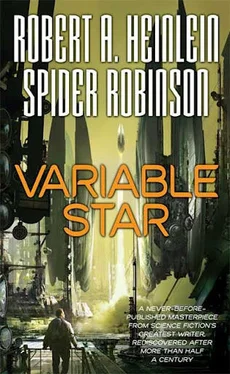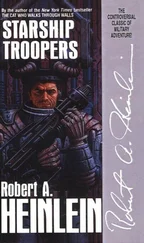I said, “If that were true, the human race would have died out a long time ago.”
“And there’d never have been a second generation of Irishmen,” Herb agreed.
Weird, now, remembering that was the last thing I said that morning. Reality can get away with things you’d never buy in fiction.
“I really appreciate it, Herb,” Paul said. “How late should I come by, tonight?”
Herb checked the time. “Stick around; you can take it with you. I was just about to log on. I always put private stuff first, so if anyone runs out of time, it ain’t me.”
“Are you sure?” Paul said. “I wouldn’t want to… intrude.”
“You can’t .”
“Well, ‘distract,’ then. Extra work—”
“Got your keypad on you?”
“Sure.” He took it from his belt and opened it.
“Give it here,” Herb said. “I’ll type the data into it, then just toss it to you and keep going on my own. No extra mousing required.”
“Okay. Thanks.” He opened the display, accessed his mail account, collapsed the display again, and tossed the keypad to Herb.
Herb set it on his desk without bothering to reopen the display. He reconfigured his chair for maximum long-term comfort, and placed his beer where he could reach it with his weaker typing hand.
“You’re sure my being here won’t… I don’t know, disturb your concentration?”
I snickered.
“Not if you set yourself on fire,” Herb assured him. “Be alert: this keypad is just going to suddenly come flying in your general direction, and I can’t predict vector.”
“This is really nice of you.”
“Remember that when I’m on my knees, begging you for a loan,” Herb said. “See you later, gentlemen.”
He found home row on Paul’s keypad, closed his eyes, and went away. An indescribable series of expressions passed across his face in only a few seconds, ending in a wry grin. He began typing so rapidly, it was as if the inefficient QWERTY layout were the only thing keeping him from typing too fast for the electrons to keep up, and jamming the machine.
We watched him together for maybe half a minute.
“God, look at his face,” Paul whispered then. “Transcendence. I’d give anything for his gift.” That was the last thing he said. I swear.
I was going to tell him that he didn’t need to whisper, that he could sing it at the top of his lungs while I accompanied him on tenor. But just then we both saw Herb’s face change. Saw the transcendence start to drain out of it.
First he frowned. Then he stopped typing, became still. He started to inhale. His jaw dropped, slowly and steadily. His eyebrows lurched upward, in stages. Surprise. Amazement. Astonishment. The rising brows dragged open his eyes, and they widened in more rapid stages. Alarm. Dismay. Fear. Panic. Terror. Horror. Disbelief. Awe.
It took a total of maybe ten seconds. Maybe less. I will never forget a picosecond of it.
Paul and I knew something was terribly wrong. The color had drained from his face, veins writhed on his forehead like cooking pasta, cords of muscle stood out on his neck. My only wild hypothesis was that he was having a stroke. By now his gaping mouth had sucked a huge volume of air into his lungs. I was afraid it might never leave.
And then was horrified when it did. It may have been the worst sound that ever left a human throat. And he had very big lungs.
The devil himself would take pity on a man who screamed like that. Perhaps he did: the room’s microphones all blew out after only a second or two, and that scrambled the video feed as well. You’ve seen and heard the surviving footage, and you know how indelibly soul-searing those couple of seconds are. It went on for a good fifteen seconds. I heard the whole thing, live, four meters away in an enclosed cubic, and it did not deafen me near as much as I wished it would.
It started out as a scream of pain, very quickly escalated to mindless agony, stayed there for what seemed like a million years, mutated into despair, and then in its final seconds added in powerful undertones of unimaginable heartbreak, unendurable regret, insupportable grief.
I had absolutely no idea what had happened. I just knew it was the worst thing ever.
And it was.
We weren’t the only ones to hear a scream like that, either. Not even the only ones aboard.
By the time it dawned on me that Paul could help me carry Herb, I’d left him way too far behind. “Call Dr. Amy,” I brayed, and lurched on.
From Rup-Tooey to the elevator—nearly the ship’s radius. Black spots. Upward five decks, at the speed of capillary action. Ears pounding. From the elevator to the Infirmary, only about half a radius, but with a complicated route. Bad design. Red spots, now. Got lost and had to backtrack. Made mental note: sob the moment you can spare the air. Spotted big red “ER” and red cross ahead, just as vision began to dither out. Kept going, confident door would get out of my way.
I presume it did, but something hard just beyond it did not. I felt the impact, realized I had lost my horizon somewhere, let go of Herb, bawled, “Take him!” and waited with mild interest to learn whether I would injure my face or the back of my head.
The answer was both, but I did not find out for some time. It was the back of my head that hit first, and it hit hard enough to bounce. That was unfortunate, because just then Herb landed on my face. They say my skull made a much louder sound the second time.
I want to be clear: the problem was not shortage of autodocs—the Sheffield stocked two hundred, which someone had calculated should last five hundred people until they could build their own. It wasn’t even a shortage of autodocs warmed up and ready to use. Four casualties at one time didn’t even begin to strain the resources Dr. Amy had in place. And while many parts of the Sheffield ’s infrastructure were underspecified or even shoddy, she had made damned sure medicine was not one of them: those were ’docs fit for the Prophet’s generals.
It was nobody’s fault. It was confusion, that’s all. Everyone in that room was probably as saturated with excess adrenalin as I was or more, and most of them had more than a single emergency to deal with at once. Only one of them knew me well enough to even be in a position to infer how far I had probably just run as fast as I could, carrying a man who outweighed me by more than thirty-five kilos. And not only was she the busiest person in the room, she already knew, as almost no one else did, what had happened to cause all this. It is remarkable that she was able to function at all, and she dealt more than competently with the three acute patients she knew about.
Nobody noticed for a while that I had died, that’s all.
Obviously, somebody did catch on before I passed the critical threshold. And those really were top of the line ’docs. I was never in any real danger. But Herb and his colleagues had already been discharged by the time mine decided to decant me.
I woke as the lid unsealed, opened my eyes to see Solomon Short seated a few meters from my ’doc, looking at me. His face was distant, unreadable. As he saw that I was awake, his eyes hardened. He got up and came to my bedside. He looked so solemn I was about to tease him, when I suddenly noticed his lower lip trembling.
He leaned close, looked me in the eye, and said, without a trace of humor, “If you die one more time, I will be very angry with you. Do you understand?”
“How’s Herb? I died ?”
He straightened and nodded. “A little bit, yeah.”
“Wow. How’s—”
“He’s all right physically.”
An LCD lit yellow next to me, on a panel inside the ’doc. “And otherwise?”
Читать дальше










